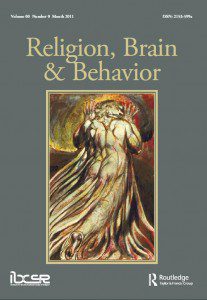Connor Wood
In 2011, Wesley Wildman, contributor to Science On Religion here at Patheos.com, made an agreement with Taylor & Francis to start publishing a new academic journal, Religion, Brain & Behavior. The journal’s mission was to provide a centralized venue for the most insightful, methodologically sophisticated, and academically valuable research in the field of the scientific study of religion – a field that’s seen rapid, even explosive, growth in recent years. Since then, Religion, Brain & Behavior has became, in scholar Michael Blume’s words, “THE cutting-edge journal for evolutionary studies of religion.” So we decided to post about the fact that Taylor & Francis is making articles from Religion, Brain & Behavior free for online access and download through the month of February.
In the 1980s, only a handful of articles on the evolutionary and biological study of religion – that is, the study of the role and origins of religion in human evolution – appeared worldwide each year. Now, more than 200 appear each year, in venues that range from social psychology and religious studies journals to journals on game theory and evolutionary science. While the multidisciplinary nature of this new, evolutionary science of religion is a major strength – it means that experts with a wide variety of backgrounds are, essentially, crowd-sourcing one of the most fascinating questions in history – it can also be a hindrance, because those experts aren’t necessarily reading one another’s work or keeping up with advancements elsewhere in the field. It’s simply too much work to hunt down every article and book published each year. But a central venue for presenting research findings, hosting methodological debates, and advancing new theories and models would give this multidisciplinary project more focus, allowing researchers from all corners of academia to maintain tabs on the big news in the evolutionary study of religion.
Recognition of this need was what drove the creation of Religion, Brain & Behavior (RBB). Two years later, the journal seems to be doing what its creators, including contributors to this blog, hoped it would do – it’s become the flagship venue for publication in the field, drawing submissions from leaders in a wide variety of scientific disciplines. But RBB isn’t just a neutral forum, or a sounding board for researchers from across the world. The journal has its own agenda: to help facilitate a productive – and much-needed – melding of views from the cognitive, biological, evolutionary, and behavioral sciences on one hand and, on the other, powerful insights from the established field of religious studies.
This is important because traditionally, religious studies has been categorized as a humanities discipline, and its practitioners have been less interested in explaining religious phenomena than in cataloguing and interpreting them in their cultural, literary, or philosophical contexts. In fact, leading lights in the field of religious studies are often downright suspicious of attempts to explain religion scientifically or to advance evolutionary models for religious practices and beliefs. Similarly, researchers in the cognitive and evolutionary sciences have often shown little interest in, or knowledge of, the remarkably sophisticated perspectives developed within religious studies. Despite their mutual indifference, however, some researchers believe that the two fields of inquiry could benefit tremendously from exchanging findings and insights, which, we hope, is where RBB comes in. As the journal’s founders, Patrick McNamara, Richard Sosis, and Wesley Wildman, put it:
When experts in the scientific study of religion operate with a lamentable lack of basic knowledge about religious studies, they should be corrected. When scholars in religious studies operate as if relevant scientific knowledge about religion does not exist, they should be challenged.
RBB‘s editorial advisory board effectively demonstrates this commitment to interdisciplinary cross-fertilization not only between the sciences, but across the yawning sciences-humanities divide. Figures from fields as diverse as sociology, philosophy, anthropology, and evolutionary biology have committed their support to growing the journal’s presence and advancing its mission. Theology, religious studies, social psychology, neuroscience, and medical science are also amply represented. These fields aren’t listed to show off – they’re to show that RBB is genuinely trying to be a new type of publication that incorporates serious insights from both the sciences and humanities.
Although it is and will remain decidedly a scientific journal, RBB‘s emphasis on biological research informed by multidisciplinary perspectives – and that passes muster against the standards and expectations of academic religious studies – means that the scientific study of religion is potentially poised to advance in exciting new directions in coming years. We don’t want to come across like we’re using this blog space to advertising something, but then again we kind of are doing just that. However, we think you’ll actually get something out of it. If you’re an interested layperson who wants to learn more, a researcher yourself, or even a skeptical outsider, Taylor & Francis’s website for RBB might be worth checking out in the next week.












